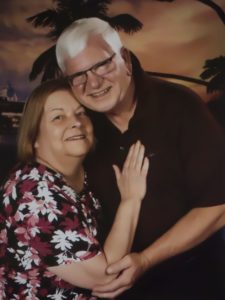“It gave us a whole additional layer of care.”

When Nancy started feeling ill just two weeks before her Alaskan cruise, her husband Nick kept a close watch on her, monitoring her symptoms for a week. It seemed Nancy was progressing, but Monday morning brought alarm when Nancy slid out of bed, lacking the energy to stand.
Nick was able to get her into a chair and called the doctor to request a same-day appointment. Still concerned, Nick retrieved their pulse oximeter to check her oxygen levels which measured at 70, then 65.
Nick immediately called the paramedics who arrived shortly to administer her oxygen, stabilize her and transfer her to Allegheny General Hospital where she was diagnosed with pneumonia and Chronic Obstructive Pulmonary Disease (COPD).
Nancy was admitted to the hospital where she stayed that evening. The following day, Nick and Nancy were “stunned” when Recovery Care Coordinator, Shayne Bayer, and Physician Assistant, Jesse Steffl, presented them with the opportunity to go home with home recovery care.
“The hospital staff communicated it with such thoughtfulness, so we were enthusiastic at the suggestion,” said Nancy. “Who doesn’t want to go home?”
Through a partnership with Contessa, she was able to be transferred home that same day with easy-to-use remote patient monitoring devices, an infusion kit, and oxygen refills. “They made the transition so easy,” said Nancy. “The nurses showed us exactly what to do. Their instructions were very clear and simple. We’ve had no problems.”
Nancy was visited twice a day by nurses who administered her IV medication, checked her vital signs and touched base via video calls. “The best part about home recovery care is of course getting to go home, but what really gives you peace of mind is knowing how closely you’re being monitored. Between the visits, the software, data check-ins and daily phone calls, I never felt uncomfortable because they were so great at checking up on me.”
Her husband Nick expressed his relief as well. “While it felt great to know she didn’t have to stay in the hospital, I got even more peace of mind knowing that I would not have to worry about what was going on while we were apart. Of course, I would have been there with her every day, but knowing she could be comfortable at home is a big relief to the spouse as well.”
Nick continued. “Additionally, we never could have received this level of care had we gone the traditional route of just being discharged. Once discharged, she would have continued to take her medicine, but the monitoring phase is what really made a difference. If she had stayed another few days in the hospital before being discharged not much could have been done until she followed up with her primary care physician a week or three down the road. But in this case, we were able to receive continued care to ensure her vitals were staying where they should be and have access to providers who checked in and were available to hear our thoughts or concerns. It gave us a whole additional layer of care.”
Nancy said she would tell anyone nervous about home recovery care to “definitely do it. You heal best at home and the technology is very easy. I am not computer literate so if I can do it, anyone can do it.”
Nancy is feeling better every day and the pair is expected to be cruising together next month.
